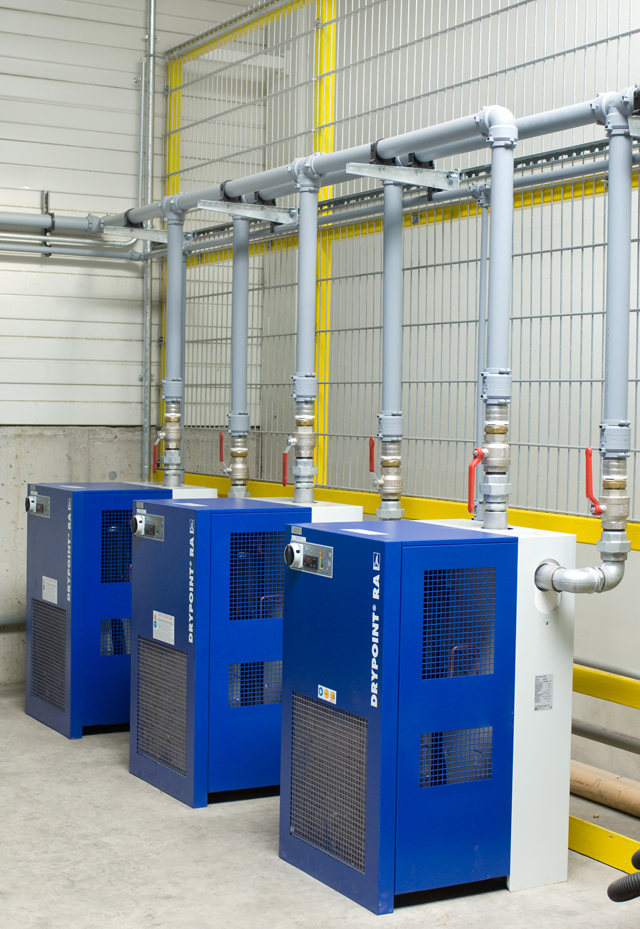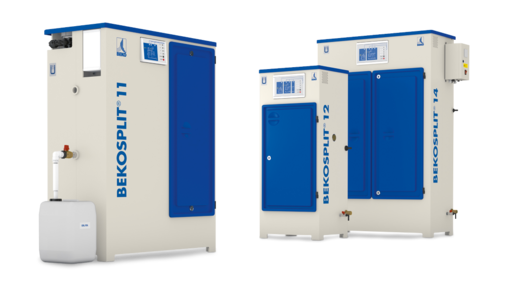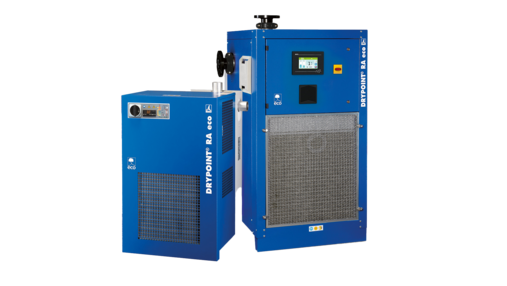Compressed air treatment as a process chain concept
| Industry: | Power transmission and traction technology |
| Customer/Location/Year: | Flender, Mussum (Germany), 2009 |
| Use of compressed air: | Process air, sealing air, condensate technology |
| Installed products: | BEKOSPLIT, CLEARPOINT, DRYPOINT RA |
Single solutions seldom lead to satisfactory results when multifaceted requirements need to be met. That is why A. Friedr. Flender AG, one of the leading providers of mechanical and electrical power transmission equipment worldwide, relies on a coherent process chain concept. Compressed-air processing as an example, presents not only technical challenges but qualitative and environmental challenges which need to be mastered.
The Flender production plant Mussum is the largest manufacturing plant worldwide for industrial couplings within torque ranges from 10 to 10,000,000 Nm. Here, flexible and highly-flexible couplings, torsionally-stiff couplings (meaning tooth couplings and all-steel multiple disc couplings) and special couplings for wind turbines and train drives are produced in a three-shift system 365 days per year. An impressive portfolio to which about 350 employees – out of 6,300 employees of the entire Flender group worldwide – are dedicated.
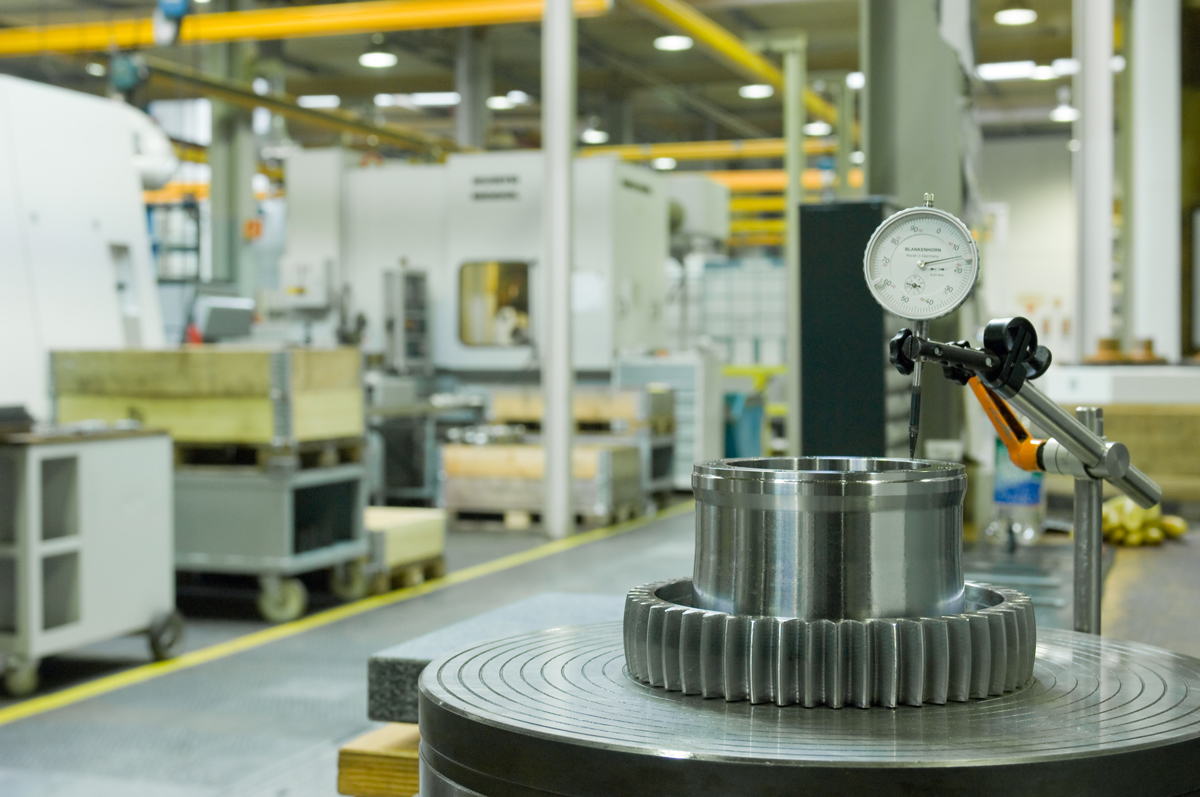
Task sharing and overall responsibility
Mussum, as a coupling factory, virtually represents a module of the form-fit Flender driveline. Activities are closely intermeshed with those of their parent plant in Bocholt and of the gear unit assembly plant in Voerde-Friedrichsfeld. They work side by side and hand in hand, according to a consistent master plan which considers all divisions and activities of the Group and consolidates them in a target-oriented manner. And this extremely successfully, as is proven by the company's long history. This strategy carries enormous potential. It is no coincidence that in 2005 Siemens AG took over Flender Holding AG so as to round off their business in the field of the industrial drive technology.
At both, Siemens AG and Flender Holding AG, planning and activities are based on coherent process chains. Not only the final result is important but also what happens before, and how it happens. Is it efficient, is it consistent, is it goal-oriented? And above all: is it justifiable? Justifiable in the sense of quality-related aspects, economic considerations and, of course, legal and ethical issues, for example with regard to environmental protection and the protection of natural resources
Good intentions and concrete results
And these are anything but catch phrases from the brochure, as concrete examples from the German Flender AG production sites show. An extremely clear example of this is the compressed-air processing and distribution in the Mussum. Most of the compressed air is required to charge the coordinate measuring instruments of the production machines with sealing air, directly followed by the charging of the direct drive motors in the machines which, in this manner, are sealed against the infiltration of moisture. A further considerable demand for compressed air exists for the employment of deburrers, in cleaning plants for the blowing off of workpieces, for paint spraying systems in paint shops, and for automatic nailers in shipping departments.
Even the infrastructure of the coupling factory relies on compressed air as the energy carrier, for example for the adjustment of rooflight domes or ventilation flaps, and for the control of ventilation systems. While some of these applications do not make special demands on the quality of compressed air, others are highly sensitive, in particular the measuring devices and coating units. The former do not tolerate residual oil in compressed air, whilst the devices in the paint shop react allergically to moisture carried along which would lead to tiny blisters in the coating of the clutch housings here. Even buyers of robust industrial technology would frown upon such a "blemish."
Complex demands on the compressed-air quality
Hence, what is needed is both compressed air which is oil-free to the largest possible extent and which is absolutely dry in order to meet the high-quality standards in the manufacturing of couplings. But this is not all. At Flender, they have further reaching "internal" targets and accordingly, self-imposed duties to align themselves with the Siemens parent company which has already been certified according to the new ISO 14001 environmental management standard. This also includes the best-possible disposal of the condensate accumulating during compressed-air processing.
What was needed was a coherent overall concept which considers all challenges and solves them in a comprehensive manner – with systems competence. After an intensive evaluation and selection procedure, Flender decided in favor of a system provider that had previously proved itself in Mussum with its products and solutions: the German compressed-air specialist BEKO TECHNOLOGIES from Neuss on the Rhine.
Together with a local cooperation partner the BEKO TECHNOLOGIES experts presented a convincing overall concept. From compression, via drying, filtering and condensate processing to residual oil monitoring, all aspects of compressed-air processing were seamlessly linked.
An emulsion-splitting plant preserves the environment
"Gem" of the constellation and, at the same time, proof of the seriousness of Flender AG in matters of environmental protection is the BEKOSPLIT emulsionsplitting plant. With this unit, even the extremely high requirements of the new ISO 14001 environmental management standard are met without difficulty.
This splitting plant for compressed-air condensates is employed where smallest oil particles exist, dispersed in the aqueous phase, so that a purely physical separation by gravity, for example via a volatile liquid separator or a coalescence separator would not suffice. In contrast, the BEKOSPLIT system offers a reliable processing technology for emulsified, oilcontaminated industrial wastewater by removing water-insoluble organic contaminants, such as oils and solid impurities via the addition of a natural alumina mineral to the wastewater. Simultaneously, existing heavy metals and other dirt particles are reliably adsorbed. Free from impurities, the outflowing water can now be discharged into the wastewater system.
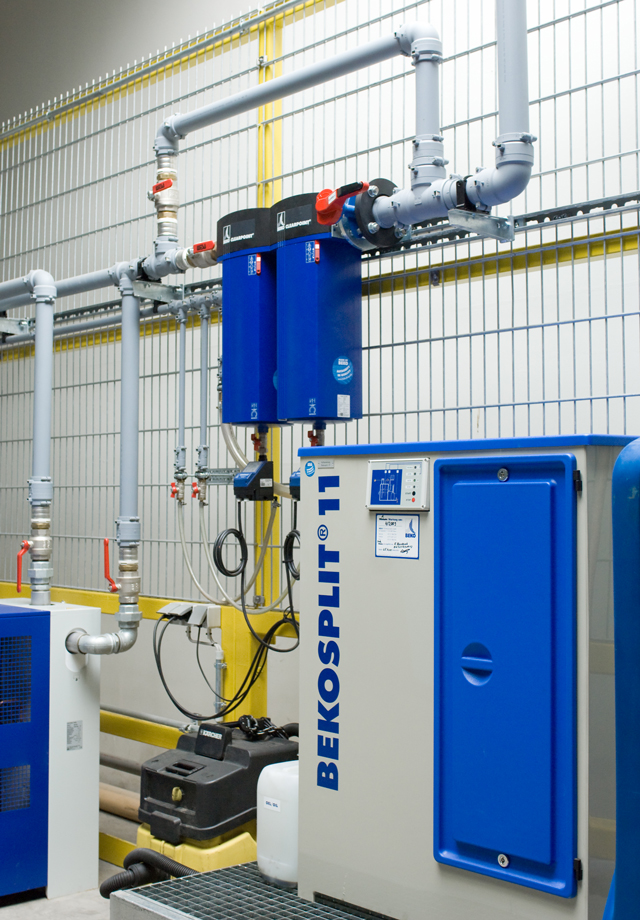
Systematically combined right from the start
The BEKOSPLIT method for compressed-air-related peak performance stands at the "disposal end" of the system chain, whilst several components act concurrently and hand in hand at the "supply start". Firstly, the compressed air is conducted via a 3,000 l tank in which part of the moisture carried along is separated.
This is followed by three DRYPOINT RA refrigeration dryers made by BEKO TECHNOLOGIES which are connected in parallel. They virtually represent a 3 x 50% solution: each of the three devices is alone capable of producing half of the drying performance required in the Flender plant. A 150% - performance is thus achieved through the parallel connection of all three refrigeration dryers. This boasts the advantage that a complete device can be removed from the system at any time, for example for maintenance purposes, without the required drying performance being impaired. Even the total breakdown of a dryer would not affect the compressed-air quality.
Avoiding compressed-air losses, the condensate accumulating in the dryers is separated by levelcontrolled BEKOMAT condensate drains and supplied to the BEKOSPLIT emulsion-splitting plant described before.
The dried compressed air is then conducted through flow-optimised CLEARPOINT compressed-air filters. With these, BEKO TECHNOLOGIES has integrated a particularly energy-efficient and thus operating cost friendly filter technology into compressed-air system.
The last checkpoint for the compressed air prior to leaving the compressor hall is a residual oil monitoring system which has also been provided by BEKO TECHNOLOGIES. All things considered, they now have a seamless, perfectly concerted process chain at their production plant in Mussum.
